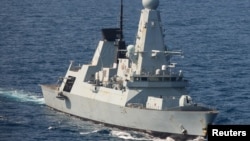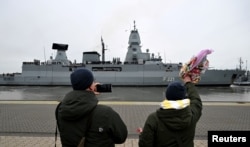Attacks by Iranian-backed Houthi militants in Yemen on international shipping in the Red Sea and Gulf of Aden may have put a dent in global trade. But U.S. officials argue a combination of airstrikes and naval convoys are allowing thousands of ships to still make the journey unscathed.
Over the past three months, an estimated 4,677 cargo ships have transited the Red Sea, the U.S. Defense Department told VOA.
Of those, 423 vessels passed through under the protection of Operation Prosperity Guardian, a U.S.-led coalition of some 20 countries that includes Britain, Bahrain, Canada, the Netherlands, Norway and Spain.
“This is something we’ll continue to keep at,” said Pentagon press secretary Major General Pat Ryder, speaking to reporters Thursday.
“The Red Sea is a vital waterway — 15% of global commerce transits through there,” Ryder said, calling the Houthi attacks “illegal and reckless.”
In addition to Operation Prosperity Guardian, which is using five warships and other naval assets to protect commercial ships, Pentagon officials say there are another four to eight vessels in the region under a separate U.S.-led coalition involved in launching several waves of preemptive strikes against Houthi assets and launch sites.
U.S. officials note they are also in contact with the European Union, which launched its own operation, Aspides, last month with Greece, Germany and Italy sending warships to the region, where they will meet up with a French warship already in the Red Sea.
Despite the U.S. and EU efforts, though, Houthi attacks have continued unabated.
Deputy Assistant Secretary of Defense Daniel Shapiro on Tuesday told U.S. lawmakers there have been “at least 48 attacks against commercial shipping and naval vessels in and around the Red Sea” since November 19.
Approximately 15 commercial ships, including four American ships, have suffered at least some damage due to the Houthi attacks.
And other defense officials told VOA the Houthis have threatened at least another 14 commercial and naval vessels.
"Our military operations will continue and advance,” Houthi leader Abdul Malik al-Houthi said during a televised address Thursday, asserting, “we have surprises that our enemies will not expect at all.”
The effects of the Houthi attacks on international shipping are still being measured.
More than a dozen major shipping companies have suspended transits of the Red Sea.
The Kiel Trade Indicator, issued by a German research institution, said last month that 80% fewer containers are passing through the Red Sea and Egypt’s Suez Canal than normally would be expected.
Global shipping giant Maersk told customers Tuesday “to prepare for disruptions to persist in the global network.”
Some information from Reuters was used in this report.





